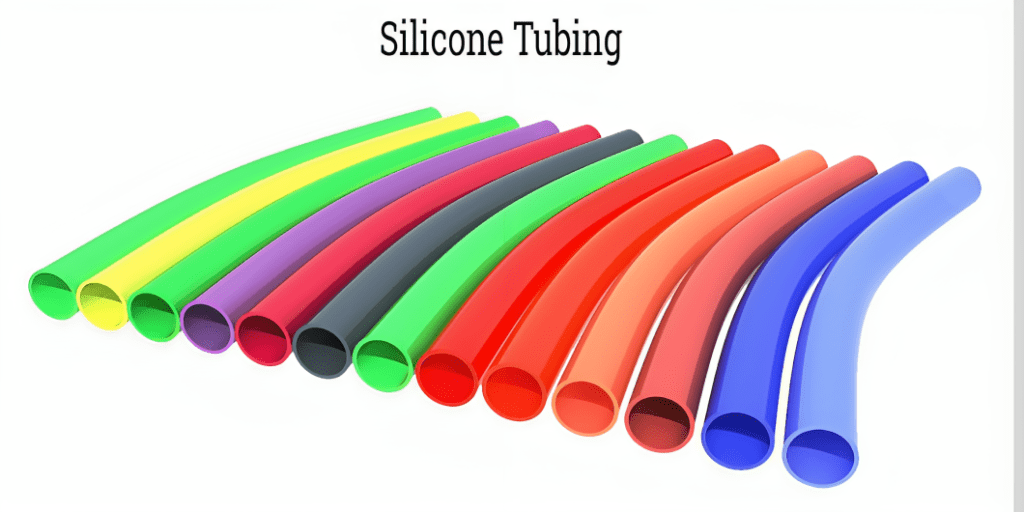Introduction

Shende Sales Corporation is India’s leading Industrial Silicone Tubing Manufacturer, Silicone Tubing is a tuff elastomer. Flexible but strong, the tubing is a vital material across a broad range of industries. The material’s resistance makes it suitable for lots of different devices like healthcare, pharmaceutical and food industries. Silicone Rubber Tubing is used extensively in the aerospace industry due to its high tensile strength, temperature resistance. It is also frequently used for vehicle and vacuum industry.
Silicone tubing is a versatile and durable material that is used in a wide range of industrial applications. It is known for its excellent heat resistance, flexibility, biocompatibility, and chemical resistance.
Properties of Industrial Silicone Tubing
Wide temperature range: Silicone tubing can withstand temperatures ranging from -60°C to 200°C, making it ideal for use in both hot and cold environments.
Chemical resistance: Silicone tubing is resistant to a wide range of chemicals, including acids, alkalis, and solvents.
Flexibility: Silicone tubing is highly flexible, making it easy to bend and route around obstacles.
Durability: Silicone tubing is resistant to abrasion, tear, and puncture, making it a long-lasting solution for demanding industrial applications.
Biocompatibility: Silicone tubing is non-toxic and non-allergenic, making it safe for use in medical and food processing applications.
Applications of Industrial Silicone Tubing
Industrial silicone tubing is used in a wide range of industries, including:
Food and beverage processing: Silicone tubing is used to transport food and beverage products through processing lines. It is also used to dispense food and beverage products into packaging containers.
Medical and pharmaceutical manufacturing: Silicone tubing is used to transport sterile fluids and medications in medical and pharmaceutical manufacturing facilities. It is also used in medical devices, such as infusion pumps and dialysis machines.
Aerospace and automotive engineering: Silicone tubing is used in aerospace and automotive engineering applications to transport fluids, such as fuel, air, and coolant. It is also used to insulate electrical wiring and components.
Chemical and petrochemical processing: Silicone tubing is used in chemical and petrochemical processing applications to transport corrosive and hazardous chemicals. It is also used to line chemical storage tanks and pipelines.
Electronics and electrical engineering: Silicone tubing is used in electronics and electrical engineering applications to insulate electrical wiring and components. It is also used to protect sensitive electronic components from moisture and dust.

Types of Industrial Silicone Tubing
Industrial silicone tubing is available in a variety of types, including:
Platinum-cured silicone tubing: Platinum-cured silicone tubing is the highest quality type of silicone tubing available. It is translucent, odorless, and tasteless. It is also the most biocompatible type of silicone tubing, making it ideal for use in medical and food processing applications.
Peroxide-cured silicone tubing: Peroxide-cured silicone tubing is a less expensive alternative to platinum-cured silicone tubing. It is opaque and has a slight rubbery odor. Peroxide-cured silicone tubing is not as biocompatible as platinum-cured silicone tubing, but it is still safe for use in most industrial applications.
Reinforced silicone tubing: Reinforced silicone tubing is silicone tubing that has been reinforced with a mesh or braid of another material, such as fiberglass or polyester. This reinforcement makes the tubing more resistant to pressure and wear and tear. Reinforced silicone tubing is typically used in applications where the tubing will be subjected to high pressure or high temperatures.
Unreinforced silicone tubing: Unreinforced silicone tubing is silicone tubing that has not been reinforced with another material. It is more flexible than reinforced silicone tubing, but it is also less resistant to pressure and wear and tear. Unreinforced silicone tubing is typically used in applications where flexibility is more important than pressure resistance.
Choosing the Right Industrial Silicone Tubing for Your Application
When choosing industrial silicone tubing, it is important to consider the following factors:
Temperature range: The temperature range at which the tubing will be used.
Chemical resistance: The types of chemicals that the tubing will be exposed to.
Pressure rating: The maximum pressure that the tubing will be subjected to.
Size and flexibility: The required size and flexibility of the tubing.
Cost: The cost of the tubing.
Working with Industrial Silicone Tubing
Industrial silicone tubing is a relatively easy material to work with. It can be cut to length using a sharp knife or scissors. It can also be connected to other fittings and components using a variety of methods, such as barbed fittings, hose clamps, and compression fittings.
When working with industrial silicone tubing, it is important to take the following precautions:
Clean the tubing before use: Silicone tubing can be cleaned using mild soap and water. It is important to clean the tubing before use to remove any contaminants that may be present.
Avoid using sharp objects: Sharp objects can damage the silicone tubing, so it is important to avoid using them when working with the tubing.
Use the correct fittings and connections: It is important to use the correct fittings and connections when working with silicone tubing
Conclusion
Industrial silicone tubing is a versatile and durable solution for a wide range of industrial applications. It is well-suited for use in demanding environments where other materials may fail. When choosing industrial silicone tubing, it is important to consider the temperature range, chemical resistance, pressure rating, size and flexibility, and cost requirements of the application.

